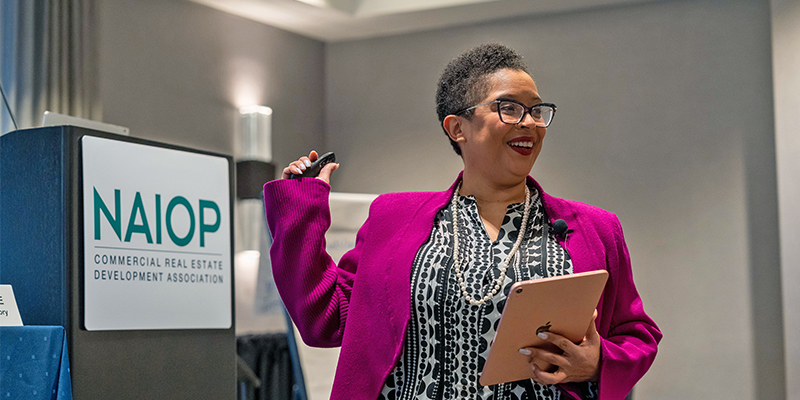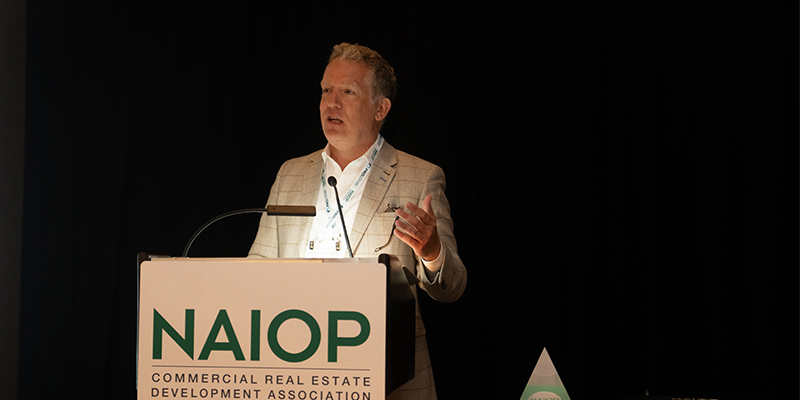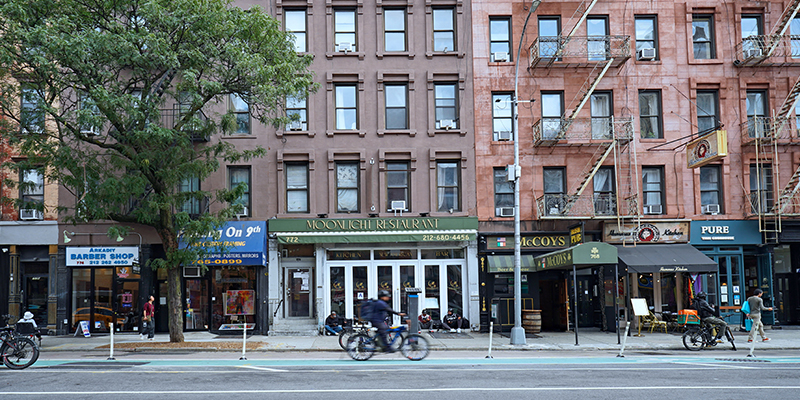The commercial real estate industry has historically been overwhelmingly made up of white males, particularly in leadership roles – but shifts are underway. The Global Real Estate DEI Survey 2022 showed that white males made up 39.1% of the workforce of North American CRE firms surveyed, down from 44% in 2021, with some other racial/ethnic groups making modest gains. However, while many commercial real estate companies now recognize the value of diversity, equity and inclusion (DEI) practices in theory, the path to successfully implement these practices can sometimes look less clear.
“We’re going to talk about how we think about this DEI work – and we are all in it together – and how we apply this to our work in communities,” said Rhonda Payne, CAE, founder and CEO of Flock Theory, during a session at NAIOP’s Chapter Leadership and Legislative Retreat in Washington, D.C. Payne shared best practices and critical considerations for DEI committees and other individuals looking to effect lasting change.
Change starts at the top. While change can start anywhere and with anyone, Payne said, there needs to be buy-in from leadership for the change to stick long term.
She noted that when people consider joining an organization or company, they often look up the people involved in leadership, such as the board of directors, to evaluate if they would fit in. The composition of a board and executive team communicates the organization’s values; if the leadership is not diverse, the organization’s commitment to DEI becomes less credible.
Consensus isn’t commitment. Just because a group has reached a majority opinion doesn’t mean that there will be agreement on specific goals or a plan of action to achieve them, Payne warned.
“Sometimes when we say we’re committed to a thing, we’re not,” Payne said. “And sometimes when it seems like everyone has reached a consensus, there may not be a commitment just because there’s consensus.”
Signs of true commitment can include funding, accountability, the commitment of time and energy, and incentives to pursue the plan of action.
Create a strategy-aligned roadmap. Implementing DEI practices is not one-size-fits-all, Payne said. A successful DEI action plan should be custom-made for your organization, your industry, opportunities in your workforce and your resourced capacity.
She recommended aligning a DEI strategic plan with the organization’s primary strategic plan, rather than having two separate plans. “You’re going to catch more momentum and have more board support – including resources – when what you’re recommending is aligned with organizational strategy.”
Plan your work, work your plan. The wide scope of DEI will leave most committees spread too thin, Payne said. A targeted approach is both more effective and makes it easier to measure the results. If there’s too much going on at once, you won’t be able to know what’s working or not, Payne said. It’s important to think about the strategic objectives for every program and how you will measure them. And, sometimes, you need to try out a plan and make adjustments as needed.
One of the session participants, Greg Boler, managing director, east region investments with Bridge Investment Group and NAIOP Georgia vice president of education, shared that his NAIOP chapter has been actively working on DEI issues for some time. He noted that Atlanta is very diverse demographically; Blacks make up 48.2% of the population, according to the latest U.S. Census, while non-Hispanic whites account for 41%, and both Asians and Hispanic or Latino account for 5%.
However, the chapter kept hearing commercial real estate firms say that they didn’t know how to find top diverse talent. NAIOP Georgia transitioned their DEI focus from exposure – making sure students from underrepresented groups knew about commercial real estate as a career option – to take additional steps for impactful change, Boler said.
NAIOP Georgia launched a paid summer internship program that pairs exposure to the industry with immediate access to networking and learning opportunities. The chapter identifies diverse students at historically Black colleges and universities and other local universities who are enrolled in real estate-related majors, interviews them, and compiles their resumes into a book of diverse talent that the chapter provides to their partner companies. NAIOP Georgia provides support services to the student interns including career panels and mentors, as well as access to chapter events for additional networking and education.
“As much as this has been a success, we feel like we’re making small steps,” said NAIOP Georgia Executive Director Debbie Koenig.
Beware business case backlash. How your committee or company talks about diversity can have a major impact on its ability to achieve its diversity goals, Payne said. Recent research showed that 80% of companies surveyed used the “business case” to justify the importance of DEI – focusing on the bottom line – while only 5% used the “fairness case” for DEI – based on moral grounds of fairness and equal opportunity.
The research report revealed that focusing on the business case can be seen as dehumanizing to the very members of the underrepresented groups that the companies are trying to attract, treating them as the means to an end – and less likely to feel comfortable or interested in working for those companies.
Companies’ rhetoric related to DEI can show up in a variety of forms, both spoken and written. Payne said it’s important to practice using bias-aware and inclusive language whether it’s in a performance review, job listing, magazine article or in conversation.
Measure outcomes. Think about the strategy, determine how you will track progress toward the goals, and then measure the outcomes, Payne advised. She said that DEI metrics allow organizations to better understand and operationalize their challenges, hold their leaders and other stakeholders responsible when making progress, and experiment with targeted interventions.
Ways to effectively measure outcomes can include tracking personnel demographics, monitoring fairness (e.g., pay equity and progression), and employees’ level of engagement and belonging.
“Real DEI impact – real, systemic impact – doesn’t happen from one person but from large groups of people working together,” Payne said.








